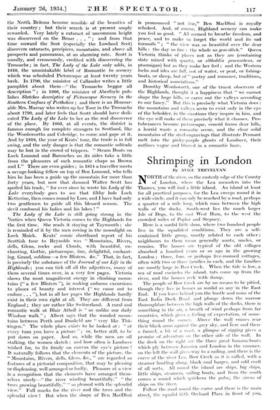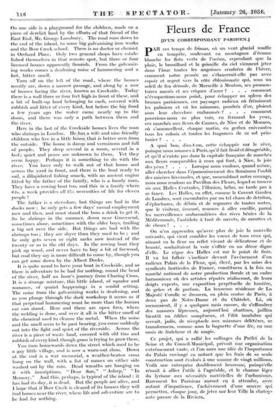Shrimping in London
By AVICE TREVELYAN
NORTH of the river, on the easterly edge of the County of London, where the Lea meanders into the Thames, you will find a little island. An island at least for all practical purposes, for the Lea sweeps round it in a wide circle, and it can only be reached by a road, perhaps a quarter of a mile long, which runs between the high walls of the docks. South-west lies the much larger Isle of Dogs, to the east West Ham, to the west the crowded miles of Poplar and Stepney.
Here is a sordid little slum, where two hundred people live in the squalidest conditions. They are a self- contained little group, mostly related to each other ; neighbours to them mean generally aunts, uncles, or cousins. The houses are typical of the old villages absorbed a hundred years or so ago in the growing London ; three, four, or perhaps five-roomed cottages, often with two or three families in each, and the families are mostly large in Bow Creek. When the tide is low, a sea of mud encircles the island, rats come up from the river, and the houses reek with damp.
• The people of Bow Creek are by no means to be pitied, though they live in houses as sordid as any in the East End. If you leave behind you the bustle and noise of the East India Dock Road, and plunge down the narrow thoroughfare between the high walls of the docks, there is something in the air, a breath of wind perhaps from far countries, which gives a feeling of expectation, of some- thing round the corner. Above the wall cranes rear their black arms against the grey sky, and Mere and there a funnel, a bit of a mast, a glimpse of rigging gives a promise of adventure on the other side of the wall. In the dock on the right arc the three great banana-boats which ply between Jamaica and London in the summer, on the left the wall gives way to a railing, and there is the curve of the river Lea, Bow Creek as it is called, with a steamer bustling along, black coal barges, and odd craft of all sorts. All round the island are ships, big ships, little ships, steamers, sailing boats, and from the south comes a sound which quickens the pulse, the sirens of ships on the river. Follow the road round the curve and there is the main street, the squalid little Orchard Place in front of you. On one side is a playground for the children, made on a piece of derelict land by the efforts of that friend of the East End, Mr. George Lansbury. The road runs down to the end of the island, to some big galvanizing iron works and the Bow Creek school. There is no doctor or chemist in Orchard Place. Only two general shops have estab- lished themselves in that remote spot, but three or four licensed houses apparently flourish. From the galvaniz- ing works comes a deafening noise of hammering and a hot, bitter smell.
Turn off on the left of the road, where the houses mostly are, down a narrow passage, and along by a row_ of houses facing the river, known as Creekside. Today there is a wall three or four feet high in front of these, and a bit of built-up land belonging to each, covered with rubbish and litter of every kind, but before the big flood a few years ago the water came nearly up to the doors, and there was only a path - between them and the river. .
Here in the last of the Creekside houses lives the man who shrimps in London. He has a wife and nine friendly children who live in a little house that is better seen from the outside. The house is damp and verminous and full of people. They sleep several in a room, several in a bed ; quiet and peace are unknown to them. Yet they seem happy. Perhaps it is something to do with the river. You have only to walk out of that house and across the yard in front, and there is the boat ready to sail, a dilapidated fishing smack, with an ancient engine fitted by the father of the family, who is a handy man. They have a rowing boat too, and this in a family where 64s. a week provides all the necessities .of life for eleven people !
The father is a stevedore, but things are bad in the docks now ; he only gets a few days' casual employment now and then, and must stand the boss a drink to get it. So he shrimps in the summer, down near Gravesend, sometimes alone, sometimes with the elder boys, trailing a big net over the side. But things are bad with the shrimps too ; they are shyer than they used to be ; and he only gets seven or eight sacks now instead of the twenty or so in the old days. In the rowing boat they pick up wood, and never have to buy a bit of firewood, but coal they say is more difficult to come by, though you can get sonic down by the Albert Docks.
It is quite usual to have your boat in Creekside, and so there is adventure to be had for nothing, round the bend of the river, half an hour's journey front Charing Cross. It is a strange mixture, this little island, of squalor and romance, of quaint happenings in a sordid setting. The noise from the galvanizing works is deafening, and as you plunge through the dark workshop it seems as if that perpetual hammering must be more than the human ear can stand. Here and there arc open fires, where the welding is done, and over it all is the bitter smell of the chemical used to cleanse the metal. When the noise and the smell seem to be past bearing, you come suddenly out into the light and quiet of the riverside. Across the river is a piece of waste land, covered with old tins and rubbish of everykind, though grass is trying to. grow there. You turn homewards down the street which used to be a gay little village, and is now a worn4mt slum. Down at the end is a war memorial, a weather-beaten cross hung on the wall, with a list of names on either side washed out by the rain. Dead wreaths are hanging on it with inscriptions, " Dear Son," " Asleep," "In Memory." And this, perhapS, is typical of the island : it has had its day, it is dead. But the people are alive, and I hope that .if Bow Creek is cleared of its houses they will find homes near-the river, where life and adventure arc to be had for nothing,











































 Previous page
Previous page